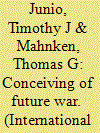|
|
|
Sort Order |
|
|
|
Items / Page
|
|
|
|
|
|
|
| Srl | Item |
| 1 |
ID:
124084


|
|
|
|
|
| Publication |
2013.
|
| Summary/Abstract |
This article introduces political scientists to scenarios-future counterfactuals-and demonstrates their value in tandem with other methodologies and across a wide range of research questions. The authors describe best practices regarding the scenario method and argue that scenarios contribute to theory building and development, identifying new hypotheses, analyzing data-poor research topics, articulating "world views," setting new research agendas, avoiding cognitive biases, and teaching. The article also establishes the low rate at which scenarios are used in the international relations subfield and situates scenarios in the broader context of political science methods. The conclusion offers two detailed examples of the effective use of scenarios.
|
|
|
|
|
|
|
|
|
|
|
|
|
|
|
|
| 2 |
ID:
124080


|
|
|
|
|
| Publication |
2013.
|
| Summary/Abstract |
Following the recent 150th anniversary of the publication of The Origin of Species, we are in the midst of a surge of Darwinian models of social change in international relations and even genetic and sociobiological analyses of politics more generally. But does being correct biologically make the Darwin/Mendel synthesis an appropriate model of change in world politics? This is an open question and one made interesting by the existence of multiple discarded models of biological evolution, most prominent among them being Lamarck's model of inheritance of acquired characteristics. So we can also ask, conversely, does being incorrect biologically disqualify a model for use in international relations? In this article, we explore this question by examining the challenges of evolutionary analysis and analyzing Lamarckian evolution side by side with Darwinian evolution. If IR is to pursue evolutionary analysis, we argue that Lamarck deserves a second look.
|
|
|
|
|
|
|
|
|
|
|
|
|
|
|
|
| 3 |
ID:
124081


|
|
|
|
|
| Publication |
2013.
|
| Summary/Abstract |
An important recent development in the discipline of International Relations (IR) has been the growing interest in the national schools and "non-core" theorizing. Even though this interest is fully justified, we argue that the tendency to describe all such schools as invariably promising and helpful in overcoming the Eurocentrism of the discipline is misguided. It originates in the false assumption that the infinite diversity of collective experiences throughout the world can only be approached on the basis of epistemological pluralism. We explore the confusion between the ontological and epistemological aspects of the problem by looking at the state of international studies in Russia. The development of Russian IR is defined by a controversy between pro-Western transitological approaches and the dominant relativist position centered around the doctrine of multipolarity. The latter is translated into the epistemological domain, leading to a totally counterproductive assertion that "Western" science is unable to understand Russia's specificity.
|
|
|
|
|
|
|
|
|
|
|
|
|
|
|
|
| 4 |
ID:
124083


|
|
|
|
|
| Publication |
2013.
|
| Summary/Abstract |
Since the 1990s, liberal warfare has attracted a good deal of debate and commentary, virtually all of which has been framed in the secular language of rights, sovereignty, power, and legitimacy. This article, in contrast, makes religion its central analytic category. Treating liberalism as a political religion, it argues that, insofar as liberal wars are fought primarily to uphold "universal" Western values, their motivation has something in common with medieval crusades. But, because that universalist ideal is vitiated by the self-interest of states, liberal wars in fact bear closer resemblance to anachronistic attempts to revive the crusading ideal in the late Middle Ages. Thus, they represent a distant, secularized echo of a pale imitation of the Crusades-or "a crusade twice removed."
|
|
|
|
|
|
|
|
|
|
|
|
|
|
|
|
|
|
|
|
|